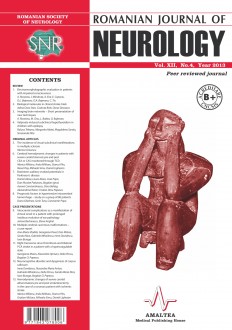SELECT ISSUE

Indexed

| |

|
|
|
| |
|
|
|

|
|
|
|
|
|
| |
|
|
HIGHLIGHTS
National Awards “Science and Research”
NEW! RJN has announced the annually National Award for "Science and Research" for the best scientific articles published throughout the year in the official journal.
Read the Recommendations for the Conduct, Reporting, Editing, and Publication of Scholarly work in Medical Journals.
The published medical research literature is a global public good. Medical journal editors have a social responsibility to promote global health by publishing, whenever possible, research that furthers health worldwide.
ELECTROENCEPHALOGRAPHIC EVALUATION IN PATIENTS WITH IMPAIRED CONSCIOUSNESS
A. Roceanu, I. Mindruta, A. Ene, E. Copaciu, O.L. Bajenaru, O.A. Bajenaru and C. Tiu
ABSTRACT
The electroencephalographic examination (EEG) records spontaneous electrical activity generated in the cerebral cortex. The EEG is abnormal in almost all conditions associated with impairment of the level of consciousness. When consciousness is impaired the EEG becomes slowed (episodic or continuous), unresponsive to afferent stimuli, amplitude diminishes until eventually becomes flat. Coma may have various causes. EEG is a diagnostic and prognostic tool in acute anoxic coma. EEG is the only diagnostic tool for detecting a non-convulsive epileptic status.
Keywords: electroencephalography (EEG), coma, impaired consciousness
